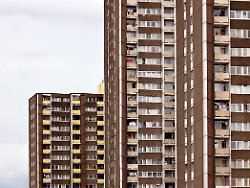Sunday 29th August 2021
Association calls for billions in aid
Social housing shortage is worsening dramatically
Despite all political assurances, the number of social housing continues to decline. In contrast, the demand is increasing in many cities. The umbrella association of the housing industry is sounding the alarm. The trend can only be stopped by multiplying public funding.
Regardless of all the federal and state housing campaigns, there is no end in sight to the shortage of affordable social housing in the coming years. The Central Association of the Housing Industry (GdW) is therefore calling for state investments to be multiplied: “The funds for social housing promotion must urgently be increased to at least four billion euros per year nationwide,” said GdW President Axel Gedaschko. “Of this, the federal and state governments must each co-finance two billion euros.”
The federal government is currently planning one billion euros per year for housing subsidies until 2024 and another billion for climate protection in 2022, according to the Federal Ministry of the Interior. The planned minimum co-financing share of the federal states for 2020 and 2021 is 30 percent.
The number of social housing has so far been declining inexorably. In 1990 there were around 3 million social housing units in Germany; by the end of 2020 there were only 1.1 million. The goal of the grand coalition for the end of the electoral term was to build 100,000 new social housing. The Union and the SPD have even surpassed that, and yet there was a decline.
Average apartment costs 226,000 euros
According to the Ministry of the Interior, more than 103,000 subsidized rental apartments were built between 2016 and 2019. But at the same time, more than 112,000 social housing units fell out of bond during the same period. The figures for 2020 are not yet included in this year’s federal real estate market report, but according to the state figures cited by the ministry, there was a further minus of 26,339 on balance. “In view of the major problems for people with low incomes and social welfare recipients to find an apartment in Germany’s major cities, one billion euros annually is by far not enough to finance social housing,” says Gedaschko.
According to GdW, the construction of an average apartment with 70 square meters now costs an average of around 266,000 euros. The association consists mainly of housing cooperatives and municipal companies that offer affordable apartments. The federal states have been responsible for social housing since 2006; the federal government only pays subsidies.
Examples from some large cities: In Bremen, almost 4,000 out of almost 11,000 social housing units have fallen out of bond within a decade. In Cologne, the number has almost halved in the past ten years, from 38,381 to 19,398 at the end of 2020. At the end of 2019, there were still a good 95,000 subsidized rental apartments in Berlin, more than 57,000 fewer than a decade earlier. Although tenant protection is a constant political issue in the federal capital, the Senate has not done much in the past few years when it comes to building new social housing. According to the official Berlin housing market report, only 4,526 new social housing were built in Germany’s largest city between 2014 and the end of 2020, although well over 15,000 have been approved.
Munich isn’t building fast enough either
However, the Senate promises that many more subsidized apartments will be built in the next few years. Some federal states and large cities started to buck the trend much earlier. These include Hamburg and Frankfurt am Main as well as Munich, where, according to the city administration, the number of 46,000 social housing has remained almost constant over the past ten years.
But the Munich example also shows that the need in the Bavarian capital, which has become more or less unaffordable for low-income earners, has nonetheless increased. “The Office for Housing and Migration has recorded an average increase of around 800 applications for a subsidized apartment every month since July 2020,” says a spokesman for the Munich social department. Almost 15,000 eligible households are currently registered with the city administration.
The shortage is even greater in relation to the number of social housing available, for example in Cologne: There are 14,300 eligible households registered there, as a town hall spokeswoman announced. In Frankfurt, for example, there are just under 9,000, in Nuremberg 6500. According to GdW estimates, it would not be 100,000 new social housing that would be necessary in four years, but 320,000.
.
